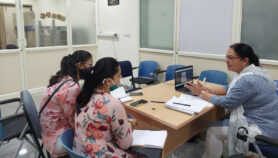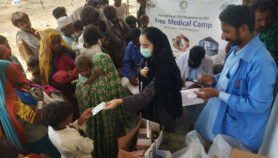By: Priya Shetty
Send to a friend
The details you provide on this page will not be used to send unsolicited email, and will not be sold to a 3rd party. See privacy policy.
A specialist in global development policy says efforts to tackle some of the world’s biggest problems are virtually ineffective because they cannot be measured.
Amir Attaran, made his comments as world leaders gather at the UN this week to discuss progress towards the Millennium Development Goals (MDGs) — internationally agreed targets aimed at addressing problems such as disease, poverty, and hunger.
Attaran, whose views are published today (13 September) in PLoS Medicine, says that unless the UN uses scientifically valid measurements, the millions of lives that the eight MDGs were designed to save could be lost.
Laudable as the goals are, he says, the scientific evidence at their core is so unreliable that the targets themselves are almost meaningless.
For example, when the MDGs were set in 2000, scientists knew little about how many people are infected with, and die from, malaria. So with no baseline figure to work from, argues Attaran, it is "futile" to talk of reducing the number of people dying from malaria.
Measuring the effect of tuberculosis is similarly difficult, he says. No country counts the numbers of new patients with the disease, a measure that the MDGs relating to tuberculosis focus on. The World Health Organization’s method is too weak to be used with any confidence, says Attaran, who is based at Canada’s University of Ottawa.
The implication of this, he states, is that scientists have little idea of whether the MDGs for malaria and tuberculosis are on schedule.
Tomorrow, global leaders will meet to discuss progress on the goals. The UN has ordered that they should not be "distracted by arguments over the measurement of the MDGs". Attaran says the order is "illogical and sabotages the MDGs’ chances of success".
Attaran adds that this delay means that the next chance for UN scientists to present more accurate measurements will probably be in 2010. This is just five years away from when the goals are meant to be achieved.
In view of the difficulty in measuring the MDGs, making them international goals to which almost all scientific effort is now directed is misguided, he says.
In a response to Attaran’s comments published today on the SciDev.Net website, Jeffrey Sachs and colleagues at the UN Millennium Project say "although Attaran raises important points on the poor quality of data for measures of progress on the MDGs, he uses these findings to draw the wrong conclusions" (see Millennium Development Goals ‘not doomed to fail’).
Attaran does not suggest discarding the goals, but altering them to ones that can be properly measured.
He adds that some scientists’ suggestions that the MDGs are ‘aspirational’ and not a measuring exercise is "shameful". European or US leaders, he points out, would not describe efforts to reduce unemployment or teen pregnancy in their own countries as mere aspirations.
If the UN wishes to maintain its credibility, and save the lives it has promised to, says Attaran, it must engage in "more thoughtful and timely action".













